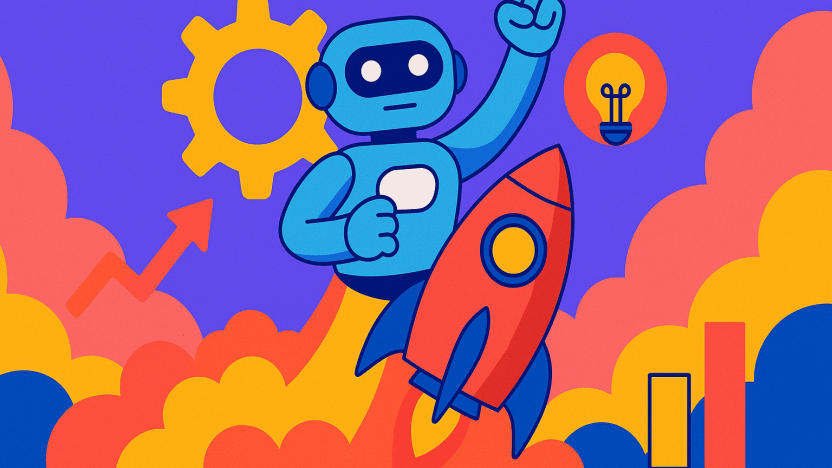The startup world is going through a major change as artificial intelligence (AI) transforms the way businesses operate. From Silicon Valley to new tech centers around the globe, AI isn’t just another tech trend – it’s becoming the driving force behind innovation and competitive advantage and its beginning for AI startup transformation.
2024 is a crucial year for startups as they adapt to this new reality. With AI being integrated into various aspects of business, there are now opportunities that were never available before:
- Democratized Innovation: Small teams can now use powerful AI tools that were once only accessible to large tech companies.
- Market Disruption: AI-powered solutions are creating new ways of doing business and generating income.
- Enhanced Efficiency: Automation and intelligent algorithms are lowering operational costs and speeding up growth.
AI’s impact can be seen across different industries:
- Healthcare startups are using AI to improve patient care through advanced diagnostics.
- Financial technology companies are employing AI for assessing risks and detecting fraud.
- Educational platforms are tailoring learning experiences with the help of AI algorithms.
Knowing about these emerging trends is not just helpful – it’s essential for survival in the startup ecosystem. As we approach 2025, the line between startups that are built around AI and those that aren’t is becoming less clear. Every successful startup will need to make use of AI capabilities, either as their main product or as a way to stay competitive.
The game has changed. The question now is not whether to adopt AI, but how to use it effectively in order to create sustainable and innovative businesses for the future.
Current Investment Landscape
The startup funding landscape has experienced significant shifts in recent years. Venture capital funding saw a dramatic decline from $531 billion in 2022 to $345 billion in 2023 – a 35% drop that has reshaped investment strategies across the board.
Key Investment Trends:
- Traditional startups face heightened scrutiny from investors
- Longer due diligence processes become standard
- Higher expectations for proven business models
- Increased focus on sustainable growth metrics
This tightening of purse strings has created a competitive environment where startups must demonstrate clear value propositions and robust financial planning to secure funding.
Yet amidst this general downturn, AI startups have emerged as a bright spot in the investment landscape. These ventures captured one-third of all venture investments in 2022, marking a significant shift in investor priorities.
Factors Driving AI Investment:
- Rapid advancements in machine learning capabilities
- Scalable applications across industries
- Strong potential for high returns
- Lower operational costs through automation
- Growing market demand for AI solutions
The surge in AI startup funding stems from their unique position at the intersection of innovation and practical application. Investors recognize the transformative potential of AI technologies in:
- Customer service automation
- Data analytics and insights
- Process optimization
- Product personalization
- Risk management
This bifurcation in the investment landscape – between AI and traditional startups – reflects a broader market recognition of AI’s role in shaping future business models. While traditional startups grapple with stricter funding criteria, AI-focused ventures continue to attract substantial capital, backed by their potential to deliver scalable, innovative solutions across sectors.
The concentration of venture capital in AI startups signals a strategic pivot in investment priorities, highlighting the technology’s perceived importance in driving future economic growth and market transformation.
Sector-Specific Growth Areas
The startup landscape is witnessing remarkable growth in three key sectors: healthtech, electric vehicles, and the metaverse.
Healthtech Revolution
Tech giants are reshaping healthcare through strategic investments and partnerships. Alphabet’s DeepMind has pioneered breakthrough medical diagnostics, while Amazon’s acquisition of One Medical signals a deeper push into healthcare delivery.
Notable Healthtech Innovations:
- AI-powered diagnostic tools detecting diseases with 95% accuracy
- Remote patient monitoring systems reducing hospital readmissions by 40%
- Personalized medicine platforms using genetic data for treatment optimization
Electric Vehicle Infrastructure
The EV sector has attracted numerous innovative startups focused on charging infrastructure and battery technology.
Key Market Indicators:
- Projected market value: $457 billion by 2027
- 300% increase in charging station startups since 2020
- Battery tech ventures securing $8.5 billion in funding
Emerging Players:
- ChargePoint’s network expansion reaching 200,000+ charging locations
- StoreDot’s fast-charging batteries achieving full charge in 5 minutes
- Solid Power’s solid-state battery development attracting major automaker investments
Metaverse Market Dynamics for AI startup transformation
Despite current challenges, metaverse startups are positioning for significant growth.
Present Challenges:
- Hardware limitations
- User adoption barriers
- Content creation costs
Growth Projections:
- Market size expected to reach $1.3 trillion by 2030
- Gaming sector leading adoption rates
- Enterprise solutions gaining traction
Successful Use Cases:
- Virtual real estate platforms recording $500M+ in transactions
- Educational metaverse startups reporting 200% user growth
- Corporate training solutions showing 60% improved learning retention
The intersection of these sectors with AI technology creates unique opportunities for startups to develop innovative solutions and capture market share in rapidly expanding industries.

AI startup transformation Statistics and Trends
The AI startup landscape has experienced unprecedented growth, with a remarkable surge in new companies entering the market. Recent data shows U.S.-based AI startups secured $23 billion in funding during 2023, representing more than half of the global AI investment total of $42.5 billion.
Several key factors drive this explosive growth:
- Democratization of AI Tools: Cloud platforms now offer pre-built AI models and APIs, reducing entry barriers for new startups
- Increased Computing Power: Advanced GPUs and specialized AI processors make complex AI operations more accessible
- Rich Data Availability: The abundance of structured and unstructured data enables better AI model training
- Skilled Talent Pool: Growing number of AI specialists and data scientists entering the workforce
The advancement in deep learning technologies has revolutionized AI capabilities:
- Neural networks can now process natural language with near-human accuracy
- Computer vision systems achieve superior performance in image recognition
- Reinforcement learning enables AI to master complex decision-making tasks
2023 Global AI Funding Distribution:
- North America: 54% ($23B)
- Asia-Pacific: 27% ($11.5B)
- Europe: 16% ($6.8B)
- Rest of World: 3% ($1.2B)
The accessibility of AI development tools has created new opportunities across various sectors. Startups now leverage pre-trained models and transfer learning techniques to build sophisticated AI applications without extensive resources. This democratization has sparked innovation in:
- Healthcare diagnostics
- Financial forecasting
- Autonomous systems
- Customer service automation
The rising trend of AI-first startups shows no signs of slowing, with investors particularly interested in companies developing proprietary AI models or novel applications of existing technologies.
Market Projections for AI and Startups
The global AI market is experiencing unprecedented growth, with projections reaching $184 billion by the end of 2024. This upward trend aims for an astonishing $826.7 billion by 2030, representing a compound annual growth rate (CAGR) of 28.46%.
These numbers paint an exciting picture for startups entering the AI space:
- Investment Opportunities: The expanding market creates diverse funding channels, from traditional venture capital to corporate innovation funds
- Market Penetration: Growing demand across sectors opens doors for specialized AI solutions
- Scalability Potential: Infrastructure improvements and cloud services enable rapid scaling
The robust growth forecasts are reshaping startup strategies in several ways:
- Product Development
- Focus on AI-first approaches
- Integration of machine learning capabilities
- Emphasis on scalable solutions
- Market Positioning
- Specialization in high-growth AI subsectors
- Development of industry-specific applications
- Strategic partnerships with established tech companies
Investor confidence in AI startups remains strong, driven by:
- Market Validation: Success stories of AI implementations across industries
- Technical Advancement: Continuous improvements in AI capabilities
- Cost Efficiency: Decreasing implementation costs for AI solutions
The projected market expansion is creating unique opportunities for startups to establish themselves in specialized niches, from healthcare diagnostics to financial technology. This growth pattern suggests a future where AI capabilities become a fundamental requirement for startup success rather than just a competitive advantage.
Unicorns and Their Influence
The AI sector has seen an unprecedented rise in unicorn companies, with 214 AI-focused unicorns recorded globally as of March 2024. These billion-dollar startups are changing the market and setting new standards for valuations in the tech industry.
OpenAI is a prime example of this trend, securing a remarkable $12 billion in funding and achieving an $80 billion valuation. This valuation makes it one of the most valuable private companies in the world, showing how much investors believe in AI technology.
Key factors driving these high valuations:
- Proprietary AI technology and intellectual property
- Rapid user adoption and scalability
- Strong revenue growth potential
- Strategic partnerships with established tech giants
The rise of AI unicorns has a positive impact on the startup ecosystem. It inspires new entrepreneurs and attracts more investment capital to the sector. These success stories show that the market has confidence in AI-driven solutions and their ability to deliver significant returns on investment.
Challenges Facing Startups in a Post-AI Era
The path to success for AI startups is riddled with significant hurdles. Recent data reveals a sobering reality: 85% of AI startups shut down within their first three years of operation. This stark statistic underscores the complex challenges these ventures face in an increasingly competitive landscape.
Key Factors Behind AI Startup Failures:
- Misaligned Product-Market FitBuilding solutions without validated market demand
- Insufficient user research and feedback integration
- Poor understanding of target audience needs
- Technical Debt and Scalability IssuesRushed development leading to unstable infrastructure
- Inadequate testing and quality assurance
- Limited technical expertise in specialized AI domains
Cash Flow Management Challenges
The financial demands of AI startups present unique challenges. Development costs, talent acquisition, and infrastructure expenses create significant cash burn rates. Successful AI startups implement these strategic approaches:
- Resource OptimizationCloud cost management and optimization
- Strategic hiring and contractor utilization
- Phased development approach
- Revenue Stream DevelopmentEarly monetization strategies
- Multiple pricing tiers
- Strategic partnerships for steady income
- Investment PlanningRealistic runway calculations
- Regular financial health assessments
- Clear milestones for funding rounds
The complexity of AI development cycles often leads to extended periods without revenue. Successful startups maintain detailed financial forecasts and establish clear metrics for success. They also build strong relationships with investors who understand the unique challenges of AI development timelines.
The Transformative Potential of AI startup transformation
AI technology has become a powerful equalizer in the business landscape, enabling small startups to compete with larger companies. Small businesses can now use AI tools for tasks that previously required significant resources:
- Automated Customer Service: AI chatbots handle customer inquiries 24/7, providing service similar to larger competitors
- Data-Driven Decision Making: Advanced analytics tools help startups understand market trends and customer behavior
- Streamlined Operations: AI-powered automation reduces operational costs and improves efficiency
The potential for innovation spans across various industries:
Healthcare
- AI-powered diagnostic tools
- Personalized treatment recommendations
- Remote patient monitoring systems
Retail
- Smart inventory management
- Personalized shopping experiences
- Demand forecasting
Financial Services
- Automated risk assessment
- Fraud detection
- Personalized banking solutions
Small startups are using these capabilities to challenge traditional industries. One notable example is Lemonade Insurance, which uses AI to process claims in seconds instead of days. In manufacturing, startups like Augury use AI-powered predictive maintenance to prevent equipment failures before they happen.
These transformative applications show how AI makes advanced business capabilities accessible to all, allowing startups to innovate and compete in markets that were previously out of reach.
Conclusion for AI startup transformation
The startup landscape is at a crucial point in this post-AI era. Our analysis shows two sides: great opportunities and significant challenges. The projected $826.7 billion AI market by 2030 creates fertile ground for innovative startups, yet success demands strategic adaptation and resilience.
Successful startups will:
- Embrace AI Integration: Not just as a feature, but as a core business element
- Focus on Sustainable Growth: Building robust business models beyond initial AI excitement
- Prioritize Ethical Development: Creating responsible AI solutions that address real-world needs
The future belongs to startups that can harness AI’s power while maintaining human-centric approaches. Despite the high failure rates, the democratization of AI tools opens doors for entrepreneurs worldwide. The next decade will likely see a new generation of startups reshaping industries through AI innovation, creating solutions we haven’t yet imagined for AI startup transformation.
The post-AI startup ecosystem isn’t just evolving—it’s undergoing a complete transformation. Those who adapt, innovate, and stay resilient will thrive in this new era.



